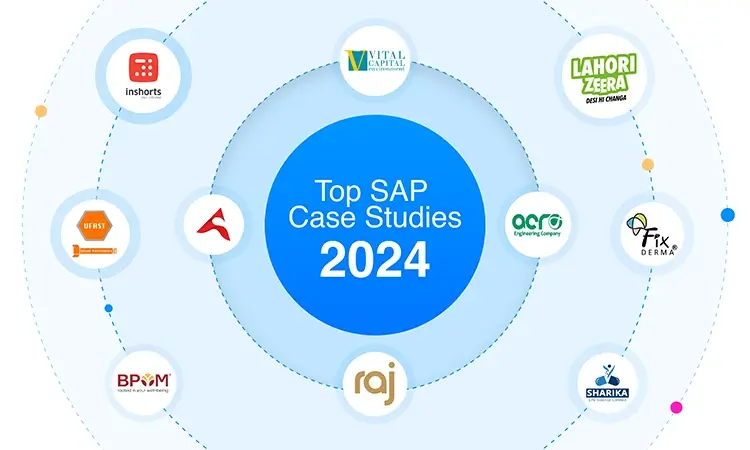One person cannot handle all business chores. The same is true when it comes to tech. As you plan ERP adoption, you need license guidance and support. Hurdle crossed? As you choose SAP deployment, you need expertise for embedding it within your organization. We all encounter challenges; how we turn them into conquests makes all the difference!
Managed infrastructure services by partner companies can serve as a strategic asset for expediting your modernization efforts, gaining access to in-demand talent, and swiftly attaining your organization’s cloud-related objectives.
Why did we say this?
Partnership Has Power
To start with the fundamentals, enlisting the services of a managed solutions partner entails entrusting them with the day-to-day operations of your SAP infrastructure, relieving a substantial burden from your IT organization. This newfound freedom allows your IT department to reallocate its focus, energy, and talent toward driving the essential modernization and transformation efforts required to fully leverage the benefits of SAP technology.
Furthermore, when you select the right type of partner, they can not only provide additional user adoption SAP capacity but also offer invaluable expertise and experience. With the appropriate ERP adoption structures in place, you can facilitate a process of knowledge transfer to transform and enhance the skillset of your own organization.
A third crucial consideration is the distinct capabilities that a partner can introduce. Given the rapid advancement of generative AI technologies like ChatGPT, there’s a tangible impact on infrastructure operations. AI has the potential to automate and enhance various aspects, including predictive and preventive maintenance, cloud infrastructure management, talent development, and more. A partner well-versed in AI implementation and SAP deployment can expedite user adoption SAP and maximize the value derived from these innovations.
By the time we said all this, we’d now re-phase our own statement, ‘Partnership has superpowers!’ And, we’re sure you agree!
But is this the real, modern approach to leveraging SAP rapid deployment solutions? Not really. We explain this further.
The Modern Approach – A Continuous Partnership
ERP adoption is not just a matter of handing over the keys and watching someone drive. It’s a dynamic watch of perpetual progress, unceasing innovation, and unwavering partnership.
Consider SAP rapid deployment solutions as a prime example. To truly unlock their potential, it’s not a one-and-done scenario; it’s an unending journey of optimization and enhancement. Continuous monitoring and improvement are paramount, and the right managed services partner becomes your compass, guiding this ongoing process.
Now from a legacy ERP era to SAP Business One and SAP S/4 HANA Cloud. The pace of tech innovation in ERP itself has been quite the buzz. Thus, a co-sourcing approach that’s as dynamic as the technology itself becomes imperative. Your company and its partner should be in sync, actively identifying future needs, charting the course, and evolving services in tandem with this ever-changing ERP frontier.
Now, along with the support of a partner, you, as someone embracing ERP adoption, should be able to differentiate between the various SAP rapid deployment solutions – SAP adoption, SAP implementation, SAP migration, SAP integration, SAP user adoption support and SAP managed services.
SAP Deployment Journey – Services and Solutions
SAP Adoption: SAP adoption involves the initial phase of embracing SAP solutions, where you evaluate the applicability of SAP to your organization’s needs, create a strategic roadmap, and outline the scope of implementation.
SAP Implementation: SAP implementation encompasses the actual deployment of SAP software within your organization. It includes configuring the software, migrating data, customizing it to your specific requirements, and ensuring a smooth transition to the new system.
A few people confuse SAP ERP adoption vs implementation. SAP ERP adoption is the broader process of embracing SAP’s enterprise resource planning (ERP) solutions within an organization. It involves assessing the strategic fit of SAP for the business, defining objectives, and creating a roadmap for implementation. SAP implementation is a specific phase within the adoption process. It involves the actual deployment of SAP software, configuring it to meet organizational needs, migrating data, and customizing the system. Implementation ensures that SAP is effectively integrated into daily operations, enabling the organization to benefit from enhanced efficiency, data accuracy, and streamlined processes. That was for quick clarity on SAP ERP adoption vs implementation. Let’s circle back to the SAP services.
SAP Migration: SAP migration focuses on transferring your existing data and processes from legacy systems to SAP. It’s a critical step in ensuring that your historical data and operations seamlessly integrate with SAP’s capabilities.
SAP Integration: SAP integration involves linking SAP systems with other applications and platforms in your tech ecosystem. This enables data flow and process synchronization across your entire organization, enhancing efficiency and collaboration.
SAP User Adoption Support: User adoption SAP is vital for the success of your SAP deployment. This service provides training, support, and resources to ensure that your employees are proficient in using SAP tools and fully embrace the new system.
SAP user adoption support is underrated, but one of the key areas of consideration. Because, what is an ERP that integrates the company’s operations together if the people themselves cannot adopt, use or understand it?
Uneecops: Bridging the Gap
Uneecops, Asia’s leading SAP partner and India’s #1 SAP platinum partner, recognizes the pivotal role user adoption plays in the successful deployment of SAP solutions. We understand that investing in SAP isn’t just about acquiring software; it’s about empowering your workforce to utilize it effectively. Here’s how Uneecops is turning SAP deployment into a triumph through its user adoption support:
1. Tailored Training Programs
Uneecops doesn’t take a one-size-fits-all approach to training. Our 300+ SAP certified experts assess the unique needs of each organization and develop tailored training programs that cater to the specific requirements of their users. This approach ensures that employees receive training that is relevant to their roles, making it easier for them to grasp and apply SAP functionalities in their daily tasks. This stands true for both – SAP Business One and SAP S/4 HANA user adoption support.
2. Change Management Expertise
Change is often met with resistance, especially in the corporate world. Uneecops excels in change management, guiding organizations through the transition period smoothly. We provide strategies, communication plans, and support mechanisms that help employees embrace change with enthusiasm rather than apprehension.
3. User-Friendly Solutions
Uneecops doesn’t just implement SAP; we optimize it for user-friendliness. Our experts customize SAP interfaces to align with the organization’s workflow, making navigation intuitive and hassle-free. This customization ensures that employees don’t view SAP as an impediment but rather as a tool that enhances their efficiency.
4. Ongoing Support
Uneecops’ commitment to user adoption doesn’t end with the initial deployment. We provide continuous SAP Business One and SAP S/4 HANA user adoption support, addressing any issues, and ensuring that employees have a reliable source of assistance as they continue to use SAP. This ongoing support encourages users to explore SAP’s full potential, unlocking additional benefits for the organization.
5. Managed Services
Usually, managed services are a separate part of SAP services. But as a continuous journey, Uneecops SAP managed services offer ongoing support and maintenance for your SAP environment. This includes monitoring system performance, resolving issues, applying updates, and ensuring that your SAP system remains optimized and aligned with your evolving business needs.
Each of the above SAP rapid deployment solutions plays a crucial role in your ERP journey, and with the right partner, you can navigate them effectively to maximize the benefits of SAP technology.
In the contemporary business landscape, a robust digital foundation stands as the primary driver of competitive edge. It serves as the bedrock upon which extraordinary customer experiences are crafted and groundbreaking innovations take shape. Within this digital core of enterprises, SAP ERP plays an indispensable role and forms a crucial component of the overarching strategy for transformation. Partnering with a proficient infrastructure managed services provider can expedite the transition to novel paradigms of cloud-based operations and work methods, thereby unleashing elevated value for the organization.
A Partner That Has A Continuous Transformation DNA
When it comes to Uneecops’ SAP implementation services, envision it as your springboard for transformation. Think of us as someone who possesses the cloud infrastructure expertise, hands-on experience, and unwavering capability to propel modernization while expertly managing your infrastructure.
Ditch the outdated notion of one-size-fits-all outsourcing. Embrace our SAP services as a truly collaborative alliance to turn SAP deployment challenges into triumphs. Or as we call it, build your L.I.V.E. enterprise with Uneecops!







